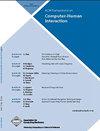患者在常规数字治疗中接受智能手表自我监测的混合方法研究
IF 4.8
2区 计算机科学
Q1 COMPUTER SCIENCE, CYBERNETICS
引用次数: 0
摘要
对情绪和生活习惯的自我监测是许多疗法的基石,但它仍然受到持续存在的问题的阻碍,包括记录不准确、监测差距、患者负担和感知耻辱。智能手表有潜力提供增强的自我报告,但它们在临床心理健康环境中的接受度尚未被探索,并且由于复杂的理论环境和对纵向视角的需求而变得困难。我们推出了情绪监测智能手表应用程序,用于情绪和生活习惯的自我监测。我们在为期8周的常规数字治疗中调查了患者对该应用程序的接受情况。我们招募了35名英国国家卫生服务局的患者,并通过三份在线问卷和一次研究后访谈评估了他们的接受程度。我们通过比较35名使用智能手表的患者和另外34名未使用智能手表(像往常一样进行数字治疗)的患者的临床、使用和接受指标,评估了情绪监测器的临床可行性。研究结果表明,智能手表应用程序被患者高度接受,揭示了哪些因素促进和阻碍了这种接受,并支持临床可行性。我们为智能手表上的自我监测设计提供了指导方针,并反思了HCI研究的开展情况,该研究评估了用户对心理健康技术的接受程度。本文章由计算机程序翻译,如有差异,请以英文原文为准。
Patient Acceptance of Self-Monitoring on Smartwatch in a Routine Digital Therapy: a Mixed-Methods Study
Self-monitoring of mood and lifestyle habits is the cornerstone of many therapies, but it is still hindered by persistent issues including inaccurate records, gaps in the monitoring, patient burden, and perceived stigma. Smartwatches have potential to deliver enhanced self-reports, but their acceptance in clinical mental health settings is unexplored and rendered difficult by a complex theoretical landscape and need for a longitudinal perspective. We present the Mood Monitor smartwatch application for mood and lifestyle habits self-monitoring. We investigated patient acceptance of the app within a routine 8-week digital therapy. We recruited 35 patients of the UK’s National Health Service and evaluated their acceptance through three online questionnaires and a post-study interview. We assessed the clinical feasibility of the Mood Monitor by comparing clinical, usage, and acceptance metrics obtained from the 35 patients with smartwatch with those from an additional 34 patients without smartwatch (digital treatment as usual). Findings showed that the smartwatch app was highly accepted by patients, revealed which factors facilitated and impeded this acceptance, and supported clinical feasibility. We provide guidelines for the design of self-monitoring on smartwatch and reflect on the conduct of HCI research evaluating user acceptance of mental health technologies.
求助全文
通过发布文献求助,成功后即可免费获取论文全文。
去求助
来源期刊

ACM Transactions on Computer-Human Interaction
工程技术-计算机:控制论
CiteScore
8.50
自引率
5.40%
发文量
94
审稿时长
>12 weeks
期刊介绍:
This ACM Transaction seeks to be the premier archival journal in the multidisciplinary field of human-computer interaction. Since its first issue in March 1994, it has presented work of the highest scientific quality that contributes to the practice in the present and future. The primary emphasis is on results of broad application, but the journal considers original work focused on specific domains, on special requirements, on ethical issues -- the full range of design, development, and use of interactive systems.
 求助内容:
求助内容: 应助结果提醒方式:
应助结果提醒方式:


